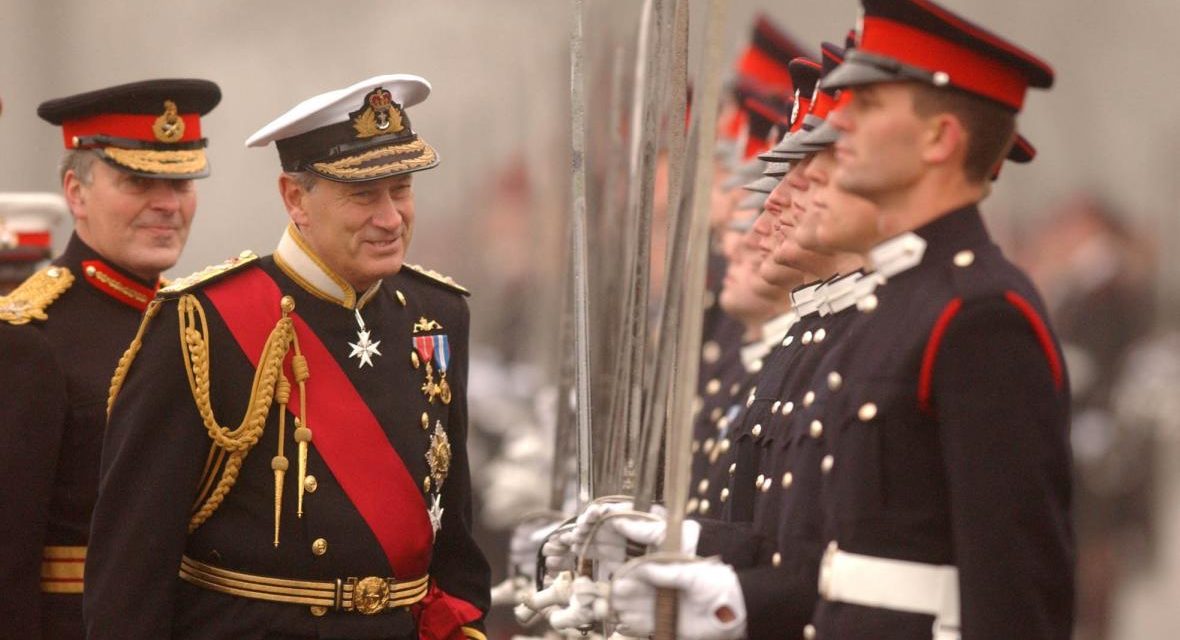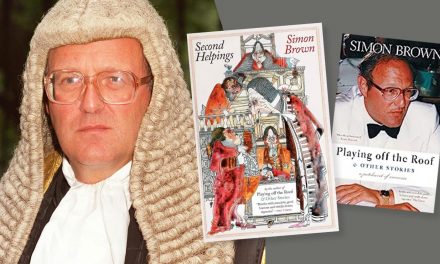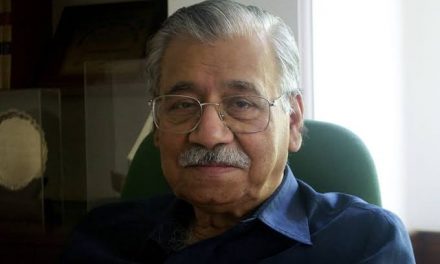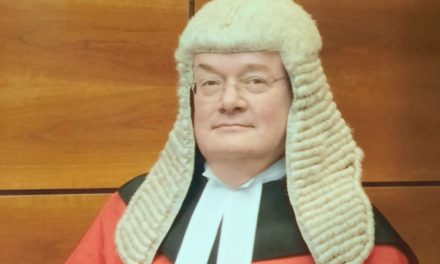The verbal broadside was launched with precision in front of the world’s press. Admiral Sir Michael Boyce, chief of the defence staff, was in full uniform, his golden submariners’ dolphins badge gleaming under the lights. In his clipped voice he revealed that he was ‘extremely concerned’ that his armed forces were unable to train for a war in Iraq because they were covering for the firefighters’ strike. His intended target, Geoff Hoon, the defence secretary, was standing just yards away. This awkward public display seemed to epitomise the pair’s deteriorating relationship.
It was November 2002, and the drums of war were beating loudly. Boyce had been appointed chief of the defence staff the previous year, a few months before the terrorist attacks of 9/11, and he had already overseen the British involvement in the war in Afghanistan. He had more reservations about the coming war in Iraq.
A tough and uncompromising leader, the admiral was diligent, dry and sometimes irascible. An avid listener, he would drill down with precise questioning until he reached the answer he sought. ‘There are no such things as problems,’ he would say, ‘only solutions in disguise.’
It was an unyielding desire to follow due process that drove him to press the attorney-general for a letter stating that an invasion of Iraq would be lawful, despite some commentators interpreting this as his questioning whether it complied with international law.
His inability to attempt even basic spin repeatedly jarred with Tony Blair’s Downing Street. ‘I only say what I see is true or correct,’ he said. ‘I won’t try to spin things or paint them with a rosy glow. I have never bothered about being unpopular. If you stick to being honest, of course it’s difficult, but not as difficult as dressing it up.’
Blair’s memoir (A Journey, 2010) noted that once it became clear that there was going to be a US-led invasion of Iraq after a UN resolution on weapons of mass destruction on November 8 2002, Boyce strongly advocated ‘boots on the ground’. Blair wrote: ’Mike Boyce, who had grown in stature and confidence as time went on, was clear that [this was] the optimum from the British perspective. He said he would have a real problem with the army if they were not involved, and such involvement alone gave us a far greater influence in shaping US thinking. This was also my own instinct.’
Boyce was criticised in some military quarters, nevertheless, for being more concerned with the legality of the war than its practicability, notably the troop levels needed for the post-conflict phase. His failure to accompany Blair when he flew to Washington in the aftermath of 9/11 was also seen as a crucial missed opportunity to help to shape the military response.
Boyce also crossed swords with the US defence community, likening its pursuit of the war on terror to ’a high-tech 21st Century posse in the Wild West’. He was given a verbal cuffing from the US defence secretary Donald Rumsfeld for suggesting that the war in Afghanistan would almost certainly ‘drag on for years’.
Once the invasion of Iraq had been launched, Boyce kept his reservations to himself and worked intense 18-hour days at the Ministry of Defence, with the demanding complexity of operations and their politics leaving him looking physically drained at times. Not only would he work into the small hours, he would then complain if he did not go home with two briefcases full of further work. Almost to protect his boss from himself one night, one of his private secretaries placed a copy of Who’s Who in one of the cases, adding a note that read: ‘Is this heavy enough?’
Hoon and Boyce had once been regular squash partners, but by the autumn of 2003 they were barely on speaking terms. In his memoir published last year, Hoon wrote that, in the run-up to the invasion of Iraq, ‘I was under pressure from Mike Boyce, the chief of the defence staff, to provide him with a clear, legal authority allowing him and the forces under his command to take action.’ Boyce clearly did not think they had had it without a second UN resolution.
When the approach was made by Boyce’s office to Hoon’s to find out whether he would be extended in the role for another year, as was usual practice, the answer that came back was a curt ‘no’. This was a bitter blow and Boyce’s short yet intense spell at the top of the armed forces came to an end in November 2003.
Michael Cecil Boyce was born in Cape Town in 1943 to Commander Hugh Boyce and his wife Madeleine (née Manley). His father had left school aged 13 but went on to become a power station manager, before joining the Royal Navy during the war and was awarded the DSC.
Boyce was educated at Hurstpierpoint College, in West Sussex, before joining the Royal Navy in 1961, aged 17. He was promoted to lieutenant in 1966, serving in HMS Anchorite, HMS Valiant and HMS Conqueror. He commanded the submarine HMS Oberon as a lieutenant, then, on being promoted to lieutenant commander in 1974, he became captain of its sister boat HMS Opossum.
The O Class boats carried out some hair-raising Cold War missions. Despite needing to surface regularly to draw air into their diesel engines, they took part in many nerve-shredding encounters with Soviet submarines beneath the Arctic ice, hatches welded closed to prevent springing by Russian depth charges.
As captain of the nuclear-powered HMS Superb between 1979 and 1981, he detected or encountered 12 Soviet submarines during a 26-day period. Boyce relished underwater life and the fierce loyalty shared by a ship’s company, explaining that ‘everybody is a submariner first, then a captain or a chef’. He never relaxed at sea. ‘Once dived you are in survival mode, if you do anything wrong you die,’ he said. ‘To have the enemy around is just a notch up.’
Given his frontline role, naval boffins one day asked if he’d give a new underwater sensor some sea trials. ‘Of course,’ Boyce responded. The prototype system was attached to HMS Superb’s hull and, once in the Soviets’ backyard, it raced at a Russian boat to see how it reacted at speed while dived. Always keen to delegate to trusted junior officers, so they could gain valuable experience, Boyce decided to let his navigator Tim McClement lead the charge while he lay on his bunk in his cabin. When they were within 1,000 yards of the Soviet submarine, McClement went to ask his captain if he wanted to join them in the control room. ‘I told you to get on with it,’ the still horizontal Boyce said, leaving McClement to take them to within 200 yards of the enemy. Thereafter Boyce was known as Iceman.
Alongside his composure, Boyce was also known for his matinee-idol looks. While he was captain of HMS Superb, the submarine paid a visit to Liverpool. Administrators ashore mixed up the guestlists for the officers’ wardroom and senior ratings’ mess and, following a whirlwind of cocktails, the womenfolk being hosted by Boyce began to eye him with rapidly heightening ardour. The second-in-command tried in vain to still the coursing hormones, but in a scene wags dubbed Boycemania, the captain eventually had to make a run for it, sprinting down the jetty, hastily slipping into the front seat of his car and ramming down the lock before making good his escape.
After his command of HMS Superb, Boyce began his canter up the ranks as he commanded the frigate HMS Brilliant, served as senior naval officer in the Middle East and worked as director of naval staff duties at the Ministry of Defence. Senior officers working for him spent much of their time offshore and, fearing they were falling behind with their paperwork, Boyce had fat wads of confidential reports shipped out to them as they worked the waters between the Cumbrae islands in the lower Firth of Clyde. He then corrected these finished reports with so much red ink that ‘it looked like he had bled on them’. A stickler for etiquette, while both first sea lord and later chief of the defence staff, Boyce was renowned for hand-writing notes of thanks to staff officers who had written him a brief.
High office beckoned and in the 1990s he was made NATO commander of allied naval forces in northwest Europe. He became first sea lord in October 1998 and oversaw the successful naval element of Britain’s intervention in Sierra Leone.
On standing down as chief of the defence staff, Boyce retired from a 42-year long Royal Navy career but continued to work for some 60 projects and charities.
He married Harriette Fletcher, a naval surgeon captain’s daughter, in 1971 and they had two children. They separated in 1994 and the union was finally dissolved in 2005. He is survived by his son, Hugo, an anaesthetist, and his daughter, Christine, a teacher at an international school in Spain.
Friends have speculated that, fearing his health might buckle under the immense stress of high office, he delayed legally ending the marriage to ensure that Harriette and their children would have the maximum possible financial protection should he die young. Harriette has counter-claimed that this is not true.
A long-term platonic friendship with the widow of a close friend, Vice-Admiral Malcolm Rutherford, deepened and he and Fleur married on Trafalgar Day in 2006. Her early death ten years later from pancreatic cancer aged 67 left him devastated, and he later poignantly confessed that his charity work gave him ‘a reason to get out of bed every morning’ after losing her.
During her final illness Fleur made Boyce — a man whose addiction to duty meant he never spent any money on himself — promise to buy himself a Bentley, which he came to relish driving.
Although he mellowed in later life, even, it was said, becoming slightly tactile, as a younger man he could seem quite buttoned up and at one point was given the ironic nickname Smiler. He had been a highly competitive sportsman in his younger days, playing navy rugby and squash and invariably succumbing to grumpiness if he lost.
His bite was unforgettable and those who encountered the admiral at his most fearsome found it a wounding experience.
Boyce admitted that he was ‘hard to penetrate’ but those who knew him best explained that beneath the flinty exterior was a warm and shy man, who was so modest he once walked away from an informal inter-admiral chat about who should paint his portrait to hang in the gun room at Britannia Royal Naval College, Dartmouth.
Admiral of the Fleet Lord Boyce KG GCB OBE DL, former chief of the defence staff, was born on April 2, 1943. He died on November 6, 2022, aged 79.
Reproduced with kind permission from The Times





